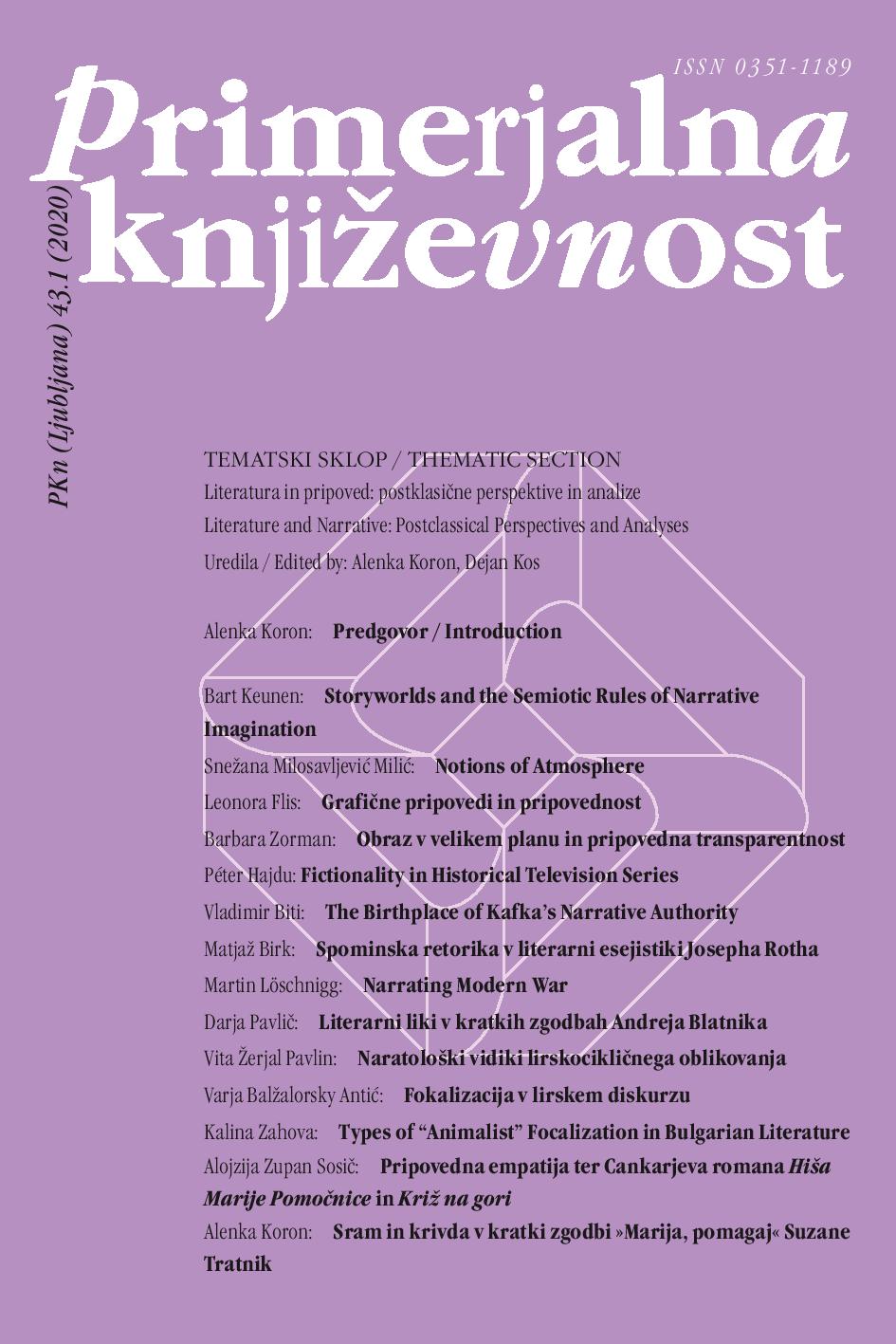Narrating Modern War: Technology and the Aesthetics of War Literature
DOI:
https://doi.org/10.3986/pkn.v43.i1.08Keywords:
literature and technology, World War I, war novel, narrative structure, war technology, crisis of representationAbstract
This essay analyses how since the early twentieth century war novels and memoirs have reflected the challenges which modern warfare poses to narrative. Mechanized warfare, I argue, resists the narrative encoding of experience, creating a crisis of narrative that is frequently made explicit in the assertion, on the part of novelists and memoirists, that the actual experience of combat cannot be narrated. Thus, for instance, the nature of warfare on the Western Front 1914–1918, characterized by the fragmentation of vision in the trenches and the exposure of soldiers to a continuous sequence of acoustic shocks, had a disruptive effect on perceptions of time and space, and consequently on the rendering of the chronotope in narrative accounts of the fighting. Since then, modern military technology has increasingly generated a sense that wars have acquired a dynamic of their own. The “cinematic” nature of technological warfare and the resulting loss of individual agency have suspended the order-creating and meaning-creating function of narrative, leading, in extremis, to the representational impasse emphasized by trauma theory. In my discussion of selected war writings, I shall show how the “cognitive narratology” of modern warfare can be applied to the analysis of aesthetic manifestations in war literature and the “crisis of language” underlying (literary) modernity and postmodernity.
References
Aldington, Richard. Death of a Hero. London: Chatto & Windus, 1929.
Baudrillard, Jean. The Gulf War Did Not Take Place. Trans. Paul Patton. Bloomington: Indiana University Press, 1995 [originally three essays in Libération and The Guardian, 1991].
Bolz, Norbert. Theorie der neuen Medien. Munich: Raben Verlag, 1990.
Campbell, James. “Combat Gnosticism: The Ideology of First World War Poetry Criticism.” New Literary History 30.1 (1999): 203–215.
Chapman, Guy. A Passionate Prodigality: Fragments of Autobiography. London: Buchan & Enright, 1933.
Chatman, Seymour. Story and Discourse: Narrative Structures in Fiction and Film. Ithaca, NY: Cornell University Press, 1978.
Couser, G. Thomas. “Going After Cacciato: The Romance and the Real War.” Journal of Narrative Technique 13.1 (1983): 1–10.
Deleuze, Gilles, and Félix Guattari. Nomadology: The War Machine. Trans. Brian Massumi. New York: Columbia University Press, 1986.
Eksteins, Modris. Rites of Spring: The Great War and the Birth of the Modern Age. Boston: Houghton Mifflin, 1989.
Fludernik, Monika. Towards a ‘Natural’ Narratology. London, New York: Routledge, 1996.
Fussell, Paul. The Great War and Modern Memory. London, Oxford, New York: Oxford University Press, 1975.
Good, Byron. Medicine, Rationality and Experience: An Anthropological Perspective. Cambridge: Cambridge University Press, 1994.
Hüppauf, Bernd. “Der Erste Weltkrieg und die Destruktion von Zeit.” Geschichte als Literatur: Formen und Grenzen der Repräsentation von Vergangenheit. Eds. Hartmut Eggert, Ulrich Profitlich, and Klaus R. Scherpe. Stuttgart: Metzler, 1990. 207–225.
Hynes, Samuel. A War Imagined: The First World War and English Culture. London: The Bodley Head, 1990.
Jünger, Ernst. “Feuer und Bewegung.” Essays I: Betrachtungen zur Zeit. Stuttgart: Klett-Cotta, 2002 [1930]. 105–117.
Jünger, Ernst. In Stahlgewittern. Stuttgart: Klett-Cotta, 2014 [1920–1967].
Leed, Eric J. No Man’s Land: Combat and Identity in World War I. Cambridge: Cambridge University Press, 1979.
Löschnigg, Martin. “How to Tell the War?: Trench Warfare and the Realist Paradigm in First World War Narratives.” Anglica: An International Journal of English Studies 27.3 (2018 [special issue: The Great War]): 143–161.
Luckhurst, Roger. The Trauma Question. London: Routledge, 2008.
. “War and Words.” The Cambridge Companion to War Writing. Ed. Kate McLoughlin. Cambridge: Cambridge University Press, 2009. 15–24.
McLoughlin, Kate. Authoring War. The Literary Representation of War from the Iliad to Iraq. Cambridge: Cambridge University Press, 2011.
Mieszkowski, Jan. Watching War. Stanford/CA: Stanford University Press, 2012.
Norris, Margot. Writing War in the Twentieth Century. Charlottesville: University Press of Virginia, 2000.
Powers, Kevin. The Yellow Birds. New York: Little, Brown, 2012.
Sassoon, Siegfried. The Complete Memoirs of George Sherston. London: Faber, 1972.
Sheehan, Paul. Modernism and the Aesthetics of Violence. Cambridge: Cambridge University Press, 2013.
Virilio, Paul. War and Cinema: The Logics of Perception. Trans. Patrick Camiller. London: Verso, 1989 [1984].
Whitehead, Anne. Trauma Fiction. Edinburgh: Edinburgh University Press, 2004.
Williams, David. Media, Memory and the First World War. Montreal, Kingston: McGill-Queen’s University Press, 2009.


